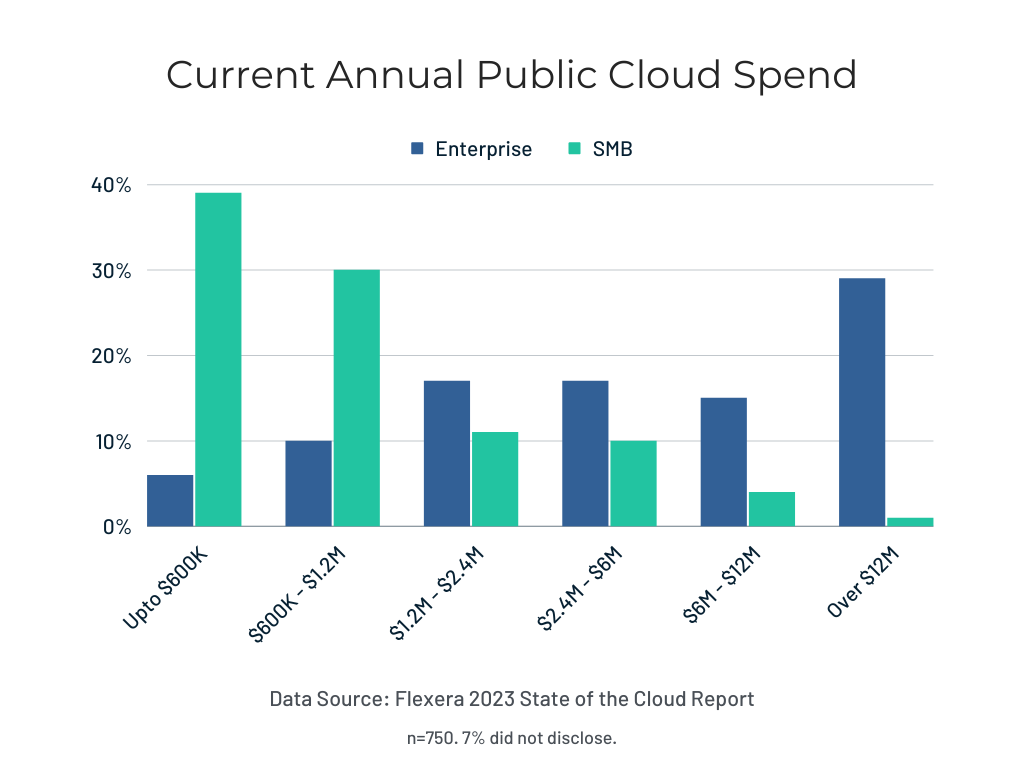
Public Cloud Waste Statistics
The 2023 State of Cloud report by Flexera includes a statistic about annual public cloud waste being at 28%. According to that same report, almost a quarter of respondents (24%) currently spend more than $12 million annually on the public cloud.

If we look at just the top 3 for each organization type:
Among enterprises:
- 34% are spending between $1.2M to $6M
- 29% are spending more than $12M
- 15% are spending between $6M to $12M
Among SMBs:
- 39% are spending up to $600K
- 30% are spending between $600K to $1.2M
- 11% are spending between $1.2M to $2.4M
Extrapolating the average annual public cloud waste spend based on the possible maximum spend for just these organizations, cloud waste amounts to ~$7.2M for each Enterprise and ~$1M for each SMB.
The overall public cloud waste is down from last year (36%), but the numbers are still staggering and should prompt organizations to reevaluate their cloud optimization strategies and consider alternatives, such as on-demand private cloud solutions. Today when organizations are being forced to lay off their workforce, this amount of cloud waste needs closer scrutiny as it may be an opportunity to survive and even thrive in the stormy macroeconomic environment.
In the light of the above information, this article presents the known benefits of private cloud, the factors that make organizations hesitant about the move, on-demand private cloud as the true alternative to public cloud, and also three business use cases that could reduce cloud spend while moving from a public cloud to an OpenMetal On-Demand Private Cloud.
The Argument for Private Cloud Over Public Cloud
The debate between private and public cloud solutions has been a longstanding one in the IT industry. In this section of the article, we will discuss the key advantages of choosing private cloud over public cloud, highlighting cost savings, operational efficiency, improved security, compliance, and higher control and customization.
Cost savings and operational efficiency
At its core, most private cloud solutions can be cheaper than public clouds primarily because organizations have direct access to the private cloud hardware. This access gives IT teams better control over the efficient usage of resources, leading to reduced waste, naturally improving cost management. This benefit applies to both on-prem infrastructure and hosted private cloud providers.
Additionally, hosted private cloud providers often have transparent and predictable pricing models instead of complicated and fluctuating public cloud billing models. This pricing model allows IT leaders to plan and manage their infrastructure budgets more efficiently.
Improved security and compliance
Both public and private clouds come with various security features. However, private cloud solutions are considered more secure due to the higher levels of control and customization, which includes among other things:
- Dedicated infrastructure
- The ability to implement customized security measures
- Greater control over data
- The ability to isolate networks
- Easier compliance with industry-specific regulations
All of these features make private clouds typically less vulnerable to data breaches than public clouds. New stricter standards around data also make private clouds more attractive to organizations with sensitive data requirements.
Higher control and customization
Private clouds offer organizations more control over their infrastructure. This allows IT teams to tailor their cloud environments to meet specific business needs. This tailoring is achieved in various ways including:
- The ability to choose the hardware, compute, storage, networking components, and the best combination thereof to run their cloud most effectively.
- Full control over the software stack from the operating system, to the middleware, to the application layer.
- The ability to use applicable open source versions of the software stack as compared to being restricted to the proprietary systems on the public cloud. This has the added benefit of enabling organizations to avoid vendor lock-in while saving on licensing fees.
- The ability to implement tailored security measures that create a robust security framework to address their unique security risks and compliance requirements.
By leveraging these advantages, companies can tailor their cloud infrastructure to meet specific business needs, improve resource utilization, and establish a foundation for innovation and growth.
Hesitancy to Move to Traditional Private Cloud
Despite the acknowledged advantages of private cloud, such as the considerable potential to decrease cloud waste and overall expenses, numerous organizations remain hesitant to embrace it. This reluctance can be attributed to a few prominent factors.
Lack of awareness about alternative private cloud options
Most organizations are still only familiar with the traditional on-prem private cloud solutions. This required significant CAPEX and dedicated technical teams to help build and manage. Even hosted private cloud solutions took weeks and sometimes months to deploy.
Alternative clouds have now hit the market, challenging the concept of traditional private clouds by delivering clouds that behave just like public clouds while having all of the inherent benefits of a private cloud. Many industry experts are referring to one such alternative category of cloud as an “on-demand private cloud.”
Traditional “lift and shift” or “land and expand” mentality
Cloud migrations strategies broadly fall under the following two categories:
- “Lift and Shift,” where applications and data are transferred from one cloud environment to another with minimal changes. This approach involves taking the application as it is and transferring it to the new cloud environment without modifying it to take advantage of the new cloud platform’s features.
- “Land and Expand,” where the application and its core framework are re-built, re-configured, and re-architected to take advantage of the new cloud platform.
Organizations sometimes take one of these migration approaches depending on the complexity of the use case and the capabilities of the targeted cloud platform.
However, adopting a more adaptable cloud migration strategy offers a range of advantages, as it enables organizations to tailor their approach according to the unique needs of their applications and infrastructures. This strategy can be viewed as a “hybrid” model, integrating elements from both “Lift and Shift” and “Land and Expand” methods.
By capitalizing on the strengths of each technique, organizations can facilitate a more seamless migration experience and enhance their cloud infrastructure over time.
OpenMetal On-Demand Private Cloud as a True Alternative to the Public Cloud
This brings us to the newest player in the market, an on-demand private cloud that can truly serve as an alternative to public cloud. Not every public cloud workload or use case can benefit from an on-demand private cloud. So it is paramount to understand what to look for in companies like OpenMetal, an alternative cloud provider.
Public cloud-like features
The benefits of a private cloud, such as those mentioned earlier, are also applicable to an on-demand private cloud. What makes an on-demand private cloud similar to a public cloud? OpenMetal incorporates several public cloud features into its hosted on-demand private cloud platform:
- Instant Deployment: OpenMetal private clouds can be deployed in under 45 seconds, with trials available for individuals and organizations.
- Pay-As-You-Go Model: Customers pay based on consumption, similar to public clouds, but with pre-determined hardware, there are no unexpected billing fluctuations.
- Self-Service Purchasing: OpenMetal Cloud Cores can be purchased online through a self-service system, as well as nodes for compute, storage, and bare metal via the OpenMetal customer portal.
- Managed Hardware: OpenMetal takes care of hosting and managing the under-cloud, maintaining hardware, patches, and security protocols.
- Rapid PoCs: OpenMetal offers a streamlined path to rapid proof of concepts for organizations, beginning with an online organizational trial on enterprise hardware and seamlessly transitioning to a production cloud.
- Easy Multi-Region: OpenMetal operates a data center location on the US East Coast and plans to open new locations on the US West Coast and Europe in early Q2 2023.
The OpenMetal advantage
In addition to the benefits of a private cloud and the integration of public cloud features, OpenMetal offers unique advantages as an on-demand private cloud platform:
- Transparent Pricing: OpenMetal provides a publicly accessible, clear, and transparent pricing model.
- Cloud Core: OpenMetal clouds begin with a cloud core comprising three hyper-converged servers, creating a strong foundation for a flexible and scalable cloud.
- Open Source: OpenMetal clouds are built on OpenStack and Ceph, both industry-leading, enterprise-grade open source systems.
- No Licensing Costs: Leveraging open-source technologies, OpenMetal clouds eliminate hidden fees and licensing costs, which are commonly found in proprietary cloud systems, including public and other private clouds.
- Starter Credits and Ramp-Up Pricing: OpenMetal assists businesses migrating to their cloud with starter credits for proof of concept cloud testing and transitioning applications and data. Ramp-up pricing, especially for startups in their growth phase, aligns pricing with business growth during the initial months, enabling customers to concentrate on expansion.
- Dedicated Support Team: OpenMetal takes pride in partnering with customers for growth. From the proof of concept phase, customers are connected to a dedicated technical team engineer who is committed to the success of their clouds.
Three Business Use-Cases That Could Benefit From Moving To OpenMetal
DevOps
Organizations embracing DevOps practices often require environments that support rapid application development, testing, and deployment.
Private clouds offer the necessary control and flexibility to create tailored environments that cater to specific DevOps requirements. This enables development and operations teams to work more efficiently and collaborate more effectively, ultimately accelerating application delivery and improving overall software quality.
Furthermore, private clouds can provide enhanced security measures to protect sensitive application data and infrastructure configurations throughout the development lifecycle.
Web hosting companies
Web hosting providers can gain a strategic advantage by white-labeling private cloud services to expand into new markets with minimal IT infrastructure investment. This approach allows for faster time-to-market, reduced costs, and a focus on core competencies.
By partnering with a private cloud provider, web hosting providers can leverage existing infrastructure, expertise, and resources while maintaining their own branding and meeting the evolving needs of their hosting customers to maintain a competitive edge.
Additionally, partnering with a private cloud provider ensures compliance and security, fostering trust and credibility with customers.
Overall, white-labeling private cloud services offers a cost-effective way to expand service offerings and grow market share.
Research and development
Companies involved in research and development often require vast computing resources and robust data storage solutions to manage large datasets, complex simulations, and sophisticated modeling tools. A private cloud infrastructure allows these organizations to efficiently allocate resources based on their specific needs, ensuring optimal performance and security for their data-intensive projects.
Conclusion
The statistic indicating that public cloud waste is at 28% serves as a stark reminder of the importance of reevaluating cloud strategies. While public cloud solutions offer significant benefits, they may not always be the best fit for every organization. Private cloud alternatives can provide cost savings, enhanced security and compliance, and greater control and customization, making them suitable for certain business use cases.
In conclusion, although public cloud solutions have been the go-to choice for many organizations, it is essential to consider all available options, including new alternatives like on-demand private clouds, to determine the best fit for your organization’s specific needs. By doing so, businesses can maximize the advantages of cloud computing while minimizing waste and ensuring that their technology infrastructure remains aligned with their overall business objectives.
Table of Contents:
- Public Cloud Waste Statistics
- The Argument for Private Cloud over Public Cloud
- Cost Savings & Operational Efficiency
- Improved security and compliance
- Higher control and customization
- Hesitancy to Move to Traditional Private Cloud
- Lack Of Awareness About Alternative Cloud Options
- Traditional “Lift and Shift” OR “Land and Expand” Mentality
- OpenMetal On-Demand Private Cloud as a True Alternative to the Public Cloud
- Public Cloud-Like Features
- Additional Advantages
- Three Business Use-Cases that could benefit from moving to OpenMetal
- DevOps
- Hosting Cloud Companies
- Research and Development
- Conclusion
Engage With OpenMetal
Test Drive a Cloud
Get a limited-time free trial to an on-demand hosted private cloud. Business email required. Other eligibility requirements apply.
Connect With Our Team
Our team is standing by to assist you with any questions you have about how our on-demand cloud platform can help your business.



































